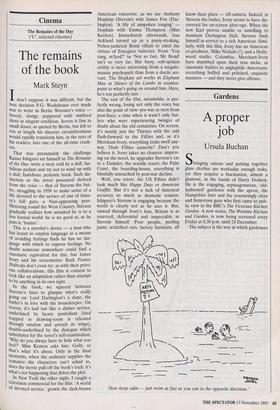Cinema
The Remains of the Day ('U', selected cinemas)
The remains of the book
Mark Steyn
Idon't suppose it was difficult, but the best decision P.G. Wodehouse ever made was to write in Bertie Wooster's voice — breezy, slangy, peppered with misfired shots at elegant erudition. Jeeves is fine in small doses, as quoted by Bertie, but left to run at length his discreet circumlocutions Would rapidly transform him, in the eyes of his readers, into one of the all-time crash- ers.
That was presumably the challenge Kazuo Ishiguro set himself in The Remains of the Day: write a story told by a dull, fas- tidious pedant and try not to wind up with a dull, fastidious, pedantic book. Such dis- tinction as the novel possessed derived from the voice — that of Stevens the but- ler, struggling in 1958 to make sense of a life devoted to the service of one of histo- ry's fall guys, a Nazi-appeasing peer. Motoring round the West Country, Stevens gradually realises how unsuited he is to a less formal world: he is no good at, as he Puts it, 'banter'.
This is a novelist's device — a man who has learnt to employ language as a means of avoiding feelings finds he has no lan- guage with which to express feelings. No doubt someone somewhere could find a cinematic equivalent for this, but James
Ivo, 3, ' . . . and his screenwriter Ruth Prawer
Jhabvala don't even try: as with their previ- ous collaborations, this film is content to look like an adaptation rather than attempt to be anything in its own right.
In the book, we squeeze between Stevens's lines to glimpse what's really going on: Lord Darlington's a dupe, the butler's in love with the housekeeper. On screen, it's laid out like a dinner service, underlined by heavy symbolism (bird trapped in drawing-room is released through window and spreads its wings), double-underlined by the dialogue which substitutes for the novel's self-examination: 'Why do you always have to hide what you feel?' Miss Kenton asks him. Golly, so that's what it's about. Only in the final moments, when the audience supplies the romance the characters can't admit to, does the movie pull off the book's trick: it's What's not happening that drives the plot.
In New York the other night, I caught a television commercial for the film. 'A world of devoted service,' growls the dark-brown
American voiceover, as we see Anthony Hopkins (Stevens) with James Fox (Dar- lington). 'A life of unspoken longing' — Hopkins with Emma Thompson (Miss Kenton). Immediately afterwards, Joss Ackland turned up as a pussy-stroking, Nehru-jacketed Bond villain to extol the virtues of Energizer batteries. From 'You rang, m'lord?' to 'Not so fast, Mr Bond' isn't so very far. But fussy, soft-spoken civility is more interesting from a megalo- maniac psychopath than from a docile ser- vant. The Hopkins act works in Elephant Man or Silence of the Lambs in counter- point to what's going on around him. Here, he's too perfectly cast.
The rest of the film, meanwhile, is per- fectly wrong, losing not only the voice but also the point of view: pre-war as seen from post-Suez, a time when it wasn't only but- lers who were experiencing twinges of doubt about the old certainties. On screen, it's mostly just the Thirties with the odd flash-forward to the Fifties and, as it's Merchant-Ivory, everything looks swell any- way. Drab Fifties austerity? Don't you believe it. Ivory takes no chances: improv- ing on the novel, he upgrades Stevens's car to a Daimler; the seaside resort, the Palm Court, the boarding-house, everything is blissfully untouched by post-war decline.
Well, you retort, the US Fifties didn't look much like Happy Days or American Graffiti. But it's not a lack of historical accuracy so much as dramatic tension. Ishiguro's Stevens is engaging because the world is clearly not as he sees it. But, viewed through Ivory's lens, Britain is as reserved, deferential and impeccable as Stevens himself. Poor people, peeling paint, scratched cars, factory furniture, all
know their place — off-camera. Indeed, in Stevens the butler, Ivory seems to have dis- covered his on-screen alter-ego. When the new Earl proves unable or unwilling to maintain Darlington Hall, Stevens finds himself in service to a rich American. Simi- larly, with this film, Ivory has an American co-producer, Mike Nichols (!), and a Holly- wood studio, Columbia. Merchant-Ivory have stumbled upon their true niche, as cinematic butlers to anglophile Americans: everything buffed and polished, exquisite manners — and they never give offence.


























































 Previous page
Previous page